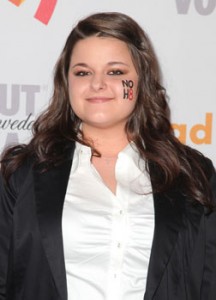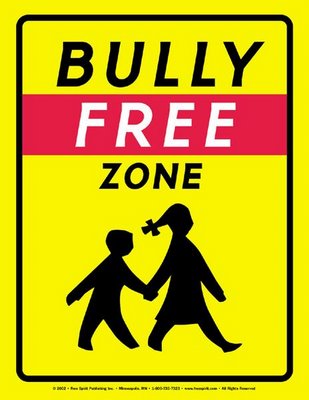Yesterday (Nov. 17, 2010) I was a guest on “Voices of Diversity,” a weekly community radio show on KBCS. The topic of this week’s show was Bullying in schools. The audio of the show will soon be available on audio archives at KBCS, but in the post below I follow up on the question of whether or not everyone *really* wants to get rid of bullies. …. See below for my elaboration:
————————————–
The recent rash of high profile suicides by boys who were bullied for gender and sexual non-conformity has created a wake up call for parents and school administrators in the U.S. To create a broader base of support from heterosexual allies, as well as to reach out to GLBT youth themselves, a number of new educational and activist initiatives have emerged. Dan Savage created the “It Gets Better” video project, directed at GLBT youth in despair over hostile treatment and at risk of killing themselves. The Gay and Lesbian Alliance against Defamation (GLAAD) declared Oct. 20, 2010 Spirit Day to call attention to and memorialize the recent suicides. Secretary of State Hillary Clinton even released her own version of an “It Gets Better” video.
Predictably, given the larger antagonistic climate toward non-heteronormative youth, not all heterosexuals have responded with as much compassion as the current US Secretary of State. Arkansas School Board vice president Clint McCance has made himself the most recent poster child for non-compassion (AKA being a big jerk) after he wrote on his Facebook page a variety of obscenities including:
“Seriously they want me to wear purple because five queers committed suicide. The only way i’m wearin it for them is if they all commit suicide.”
“It pisses me off though that we make special purple fag day for them. I like that fags can’t procreate. I also enjoy the fact that they often give each other AIDS and die.”
And perhaps the most cruel of all (at least for me as a parent):
“I would disown my kids if they were gay. They will not be welcome at my home or in my vicinity. I will absolutely run them off.”
Since Facebook is a semi-public forum, many people outside of McCance’s circle of like-minded friends witnessed his rant. All kinds of people — including people in his own community — started to wonder: Does Clint McCance *really* wish all gay kids would just kill themselves? Even if they were his own children?
After uproarious calls for his resignation (including, unfortunately, similar verbal assaults against McCance and his family), the Arkansas school board vice president agreed to an interview with Anderson Cooper on CNN (who, coincidentally, maintains a private identity but is widely reported to be gay, and whose brother committed suicide at the age of 23). Looking like a kid caught for bad behavior, McCance had little to say but claimed to be remorseful. When pressed by Cooper as to whether or not he would resign (for technical reasons he could not be fired), McCance said, yes he was resigning from the School Board.
Now that McCance is now gone (at least for now) from a school administrative position, has anything changed in his surrounding cultural and institutional system? Human behavior never happens in a vacuum – there is always a surrounding cultural and physical infrastructure that creates messages or opportunities for people to act in cruel or inequitable ways. This is more complicated than thinking about pro-social versus anti-social behavior; about “bad” school board members versus “good” ones.” This is because cruel behavior is sometimes completely in line with the social agenda of larger systems of power.
There seems to be an assumption in mainstream media outlets that “everyone” wants to get rid of bullies. But this is actually not the case, since bullying is, at a very basic level, a technique for ensuring and preserving separate and unequal distinctions between people.
In fact, people and institutions interested in preserving their separate and “superior” distinction — whether this is based on race, religion, sex, and/or sexual orientation — meet anti-bullying legislation (or related events such as “spirit day”) with lukewarm or even hostile responses.
For example, in 2001, Christian Right lobbyists stalled the first attempt to bring anti-bullying legislation to Washington State. In 2010, Clint McCance and others balked at the suggestion of a special day for mourning youth suicide connected to anti-gay bullying. In both cases, the resistance is around deep seated beliefs that boys/men and girls/women must conform to traditional gender roles (with men being “masculine”, powerful, and exclusively attracted to women; and women being “feminine”, submissive to men, and exclusively attracted to men). If they fall out of line, the logic goes, they must be corrected. Ridicule, shaming, social exclusion .. these are all forms of maintaining rigid and unequal distinctions between insiders and outsiders; they are also forms of bullying. Hence the resistance to anti-bullying legislation by some who want to maintain rigid and unequal distinctions.
Why is it that bullying tactics work “better” on some kids than others? Why don’t all queer kids commit suicide in the face of severe public ridicule and social excommunication?
One reason may be that the ones who survive — like Constance McMillen (who was subjected to a dramatic network of lies and harassment by students, teachers, and parents alike) — have access to deep resources, support, and identity outside of their world of bullies. If excluded from the bully group, they don’t feel that their entire world will disappear.

But sometimes, even for those kids who carry on in the face of bullies– more drastic forms of violent control occurs. This was the case for Matthew Shepard and Lawrence King — both of whom were murdered by other boys who were angry that they were not sufficiently hiding their feminine or “gay” characteristics.
So to sum up: for those of us truly interested in creating bully-free zones, we must directly speak out against not just individual acts of cruelty, but infrastructures which create and reinforce distinct, segregated, and unequal categories between people. This means directly questioning (not just staying silent or “neutral” to) common beliefs about what constitutes a “superior” and “inferior” person and what justifies differential treatment. It is only then that we can start to dismantle the bully.
Related Sexuality & Society stories:
- Making Hate Fun: Facebook users continue to joke en masse about killing “hookers.” Feb. 12, 2010. K. Lerum
- The real problem with “sexting”: Adult complicity in labeling teens “sluts,” “perverts,” and “criminals.” Dec. 23, 2009, K. Lerum
- Home-hatred in Uganda: A Gift from US Conservative Evangelicals. Dec. 9, 2009. K. Lerum.
- Cross-dress codes. Nov. 18, 2009. A. Nack
Recommended References & Resources:
- Andrew, Mike. “New Anti-Bullying bill passed unanimously.” Seattle Gay News. March 12, 2010.
- Gay and Lesbian Alliance against Defamation (GLAAD)
- Herek, G.M. (2004).Beyond “homophobia”: Thinking about sexual stigma and prejudice in the twenty-first century.Sexuality Research and Social Policy, 1(2), 6-24.
- Herek, G.M. Definitions: Homophobia, Heterosexism, and Sexual Prejudice.
- (for thinking about Infrastructures of Peace): International Peace Academy. The Infrastructure of Peace in Africa: Assessing the Peacebuilding Capacity of African Institutions. 2002 report.
- Patterson, Orlando. 1982. Slavery and Social Death: A Comparative Study. Cambridge, MA: Harvard University Press.
- Pascoe, C.J. (2007). Dude, You’re a Fag: Masculinity and Sexuality in High School. Berkeley, CA: University of California Press.
- Safe Schools Coalition
- Pharr, S. (1997). Homophobia as a Weapon of Sexism. Berkeley, CA: Chardon Press.
- Washington State Anti-Bullying Law (links via the King County Sexual Assault Resource Center).

